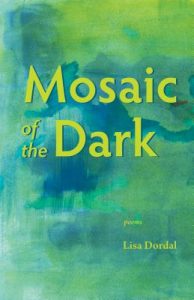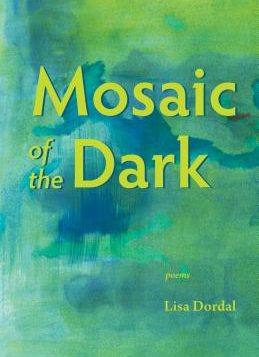 Mosaic of the Dark: Poems
Mosaic of the Dark: Poems
by Lisa Dordal
Black Lawrence Press. 192 pages, $15.95
Mosaic of the Dark reads like a memoir, with Lisa Dordal’s direct, insightful poems offering linked encounters from life. A member of the English faculty at Vanderbilt, Dordal published a book of poems titled Commemoration in 2012. Her poetic tales are plainly told, but they shed light on complex experience, including enduring loss, battling depression and grief, and coming to recognize and celebrate her lesbian self. Finding strength in her voice as a poet is a pivotal discovery.
Mosaic has a liturgical feel. Many poems suggest transformation, and some carry biblical references. “The Lies That Save Us,” for example, recounts a car trip Dordal and her then partner (now wife) took through rural Georgia, cheerily posing as sisters to forestall anti-gay reactions. Allusion is made to the patriarch Abraham, who adopted a disguise for protection when traveling through foreign lands.
A number of poems in Mosaic stop short of neat resolution and instead present puzzles to be considered afresh on each reading. Natural images abound, particularly of birds and insects. Motion is evident—not only movement from place to place, as in flight, but slow shifts over time, evoked by archeological references like “shards” or “cave.” The poems call up an aging universe and the passing of human generations.
In that regard, family forms an overall context for the collection, and Dordal’s deceased mother, with whom she has described herself as inexplicably “obsessed,” is a prominent figure. Details count, and even low-key gestures resonate. “Transaction,” for instance, recounts Dordal’s mother’s funeral. When burial rites are over, the poet watches as an undertaker gives her mother’s necklace, earrings, and wedding band back to her father, “in the knowing way that men pass tips,/ from hand to hand.”
It is clear that the mother’s dying did not end their connection, but rather freed the writer to confront enigmas embedded in her mother’s life. One such mystery was her mother’s compulsion to hide things—inside jars, in drawers, behind books on shelves—and to keep her feelings buried too. Dordal wonders what might have prompted such obsessive concealment. She holds conversations with her mother about this secrecy in a group of poems titled “Holy Week,” broaching such difficult topics as her mother’s alcoholism, and her possible lesbian sexuality, however repressed.
The poet follows this tough tack further to explore the question of whether lesbian desire could be an inherited tendency. In the poem “Passing On,” for example, written six years after her mother had died, Dordal tells of coming upon a folded piece of paper stuck to the bottom of her mother’s desk. The brittle brown scrap carries only irrelevant jottings, but finding it prompts the writer to propose a hypothesis that she probably could not have articulated while her mother was alive. Her words are measured, but they do convey astonishment. The old note had been “[t]ucked, for years, from view,” she relates, “like the queerness you passed on,/ that you received from Ida and she passed on from Lizzie—/ passed on until it opened out inside of me,/ falling out of hiding.”
This poem and others in Mosaic well illustrate Audre Lorde’s argument for poetry as a necessary “illumination” of raw experience. Dordal has arranged her hard-won discoveries in clear patterns and set them out in daylight.
________________________________________________________
Rosemary Booth is a writer and photographer living in Cambridge, MA.






